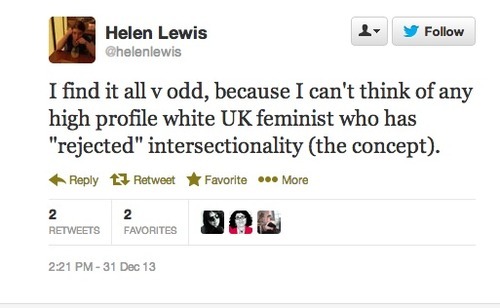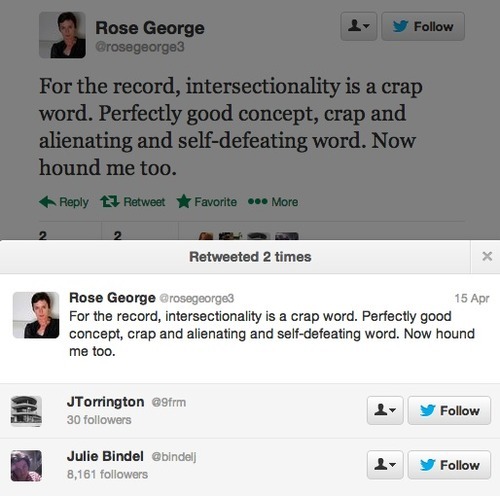“I can’t think of any high profile white UK feminist who has “rejected” intersectionality”

So apparently, no high profile white UK feminist has rejected intersectionality according to Helen Lewis. I find the wording of this tweet odd because of course, there is a little semantic gem hidden therein: a no true Scotsman argument disguised under “the concept” so that we cannot counterclaim with evidence like this, from Rose George, a TED Speaker and published author who rejects “the word” but not “the concept”.

Notice Julie Bindel’s retweet also rejecting “the word”.
On the last week of November, Rhiannon Lucy Cosslett, one of the founders of Vagenda, a publication that was originally part of New Statesman and overseen by Helen Lewis in her role of Deputy Editor, published this at The Guardian:
After talking to these young women, we wrote a column criticising academic feminists’ use of alienating terms such as “intersectionality” on the basis that most people don’t understand them. “Intersectionality” basically means taking into account the way different systems of oppression – race, class, disability, sexual orientation – relate to one another. The article raised issue with the language, not the concept, but because we deigned to criticise the method of communication, we were deemed racist.
Again, the reframing of “the concept” vs. “the word”. Ms. Cosslet goes on to explain how the use of the word itself is “privileged”. This is a new ideological framing in the sense that it positions Black women who created and developed these ideas and words and all the other Women of Color who both use the ideas and theories and continued expanding on them to explain their lives as being “more privileged” than the white women who feel alienated by their use. These words, we are told, leave us cold because we don’t know what they mean. “You are the privileged one, using words we cannot understand”. Rejecting a word created for and by a Black academic to explain her life and the lives of women like her is not an ideology free rejection. Words matter and having precise and sharp words to quickly reference a framework matter even more. It’s the difference between having to spend 10 minutes to carefully elaborate and explain an idea vs. having a tool to quickly evoke an entire body of theory and work. It’s the difference between having a scalpel vs. being handed a box of blunt knives.
At the core of this rejection of the word but not “the concept” is a rejection of knowledge produced and developed by Black women and other Women of Color. Since in the face of overwhelming evidence these white feminists cannot deny that racism is alive and kicking, then they will do the next best thing: deprive us of the use of words that help us explain how we are uniquely affected by these power structures. Again, I must insist, at the core of this denial resides an erasure of our tools, the very fabric of the theories and knowledge that explain our lives. “Use the master’s tools to dismantle the master’s house”. This is nothing but a blatant epistemic injustice. White feminists reject the knowledge produced by Black women and Women of Color to continue in control of discourses and public agendas in media, activist environments, government policy, etc. “Use our words because otherwise our issues will not be front and center”.
But since Lewis claim is that high profile UK feminists have not rejected the “concept”, then maybe we can look at how Caitlin Moran fared when confronted with the idea but not the word:

Oh, “I literally couldn’t give a shit about it”.
Back then, Vagenda Magazine, as I mentioned above, a publication overseen by Helen Lewis in her role of Deputy Editor at New Statesman published an impassioned defense of Moran* that included statements such as this:
And therein lies the nub of the problem: feminism is, and to an extent always has been, a white, middle class movement.[…]
And to an extent, why should it? If class or race, and not merely gender, is what is preventing you from becoming Director General of the BBC, or Prime Minister, or the editor of the Telegraph, then equal rights for women in isolation of these factors are going to make sod-all difference. […]
We would suggest that anyone with an interest in genuine equality for all adapt that phrase to “my feminism will be comprehensible or it will be bullshit.” Achieving “intersectionality” is impossible unless you can communicate clearly, with everyone. Moran at least speaks a language that we all understand. And how many other feminists can you credit with that?
In turn, Helen Lewis wrote her own defense of “simplified language” claiming “There’s no point in your language being “correct”, if only 12 of your friends can understand it.”. Again, not rejecting “the concept” but “words” as if concepts could be derived from the abstract without tools to define lives and, in turn, shape them.


Suzanne Moore also has feelings about the word intersectionality. Apparently, “intersectionality my arse” is not a rejection of “the concept” either. Because the works of Black women and other Women of Color belong up a white woman’s ass. Visuals of defecating on the ideas notwithstanding.
Award winning, multiple published author Stella Duffy also chimed in with her ideas about intersectionality:
I do find the term ‘intersectionality’ to be both classist and educationalist – or rather, not the term itself, but the way the twitter fight had people using it as if everyone knew what they meant.
Again, that thing about “the concept” vs. “the word”.
Sarah Ditum also rejects “the word but not the concept” going as far as calling intersectionality “an icepick” and she does a whole lot of google graph explanation about how the word was never used before a certain date which what? renders the word useless? difficult? inaccessible? Your guess is as good as mine.
Louise Mensch wrote an entire article at The Guardian about “intersectional bollocks” which is pretty much unquotable because of the sheer volume of clueless statements. It’d be impossible to pick just one. “Progressive feminists” might prefer that Mensch is not included in this list, what with her being a Tory, however, she self identifies as a feminist and is considered by many, as much of a feminist as Helen Lewis, Vagenda Magazine or Caitlin Moran. We are not here to police who does and does not belong to the movement, after all. Just bringing up the archives to remind us all where we stand on “rejecting the concept” vs. “the word”.
It is no coincidence that certain words or ideas have gained popularity in the past couple of years as the number of People of Color (and Black Twitter specifically) have gained deserved attention and generated media production in their own right. Words that explain the lives of people who are using media in innovative ways are sure to follow the phenomenon. Until not long ago, a white dominated media got to shape public discourse and the only recourse left for those that wished to challenge their hegemony was to either write a letter to the editor, hand out fliers or start a small print zine/newspaper/publishing house. White dominated media did not need acknowledge the existence of these efforts. They could reject words, concepts, ideas and even people with impunity.
This white feminism can continue “rejecting the word” and in doing so, they will continue trying to limit our world. My language shapes my worldview, my political ideas and, more importantly, my praxis. The notion that we should limit how we express ourselves rather than expand these views so that they can reach more people is part of this old hegemony that has given us exclusion, lack of representation and alienation for anyone that is not white, cis gender, able bodied, etc. In this rejection of “the word” there is a demand that Women of Color create work that reproduce the ideas and patterns of white feminism. I vehemently reject that. It is white feminism that was built on exclusion. It is white feminism’s task to undo itself and fix what they broke, not the task of Women of Color who created ideas because this white feminism was not providing them. Expecting that Women of Color use “simpler words” comes with the added aggravating demand that we do not become intellectual producers in our own rights. I doubt anyone would have asked Giles Deleuze to “simplify” his ideas so that other white men who did not understand them could also feel included. This demand of “simplification” is specific to Women of Color and their (our) knowledge production. When we write, when we discuss, when we create, when we practice our feminism, when we embody our politics, we should make them accessible to white women. We are the ones to fix what they broke. And that, with no respect at all, is bullshit.
———————————————————————————————
EDIT: On Twitter, Helen Lewis pointed out that Vagenda was not part of New Statesman. Instead, the two editors/founders of Vagenda were employed by New Statesman to blog under the name of “The V Spot”. A radically different publication, it seems.
———————————————————————————————-
* Incidentally, this is the piece that I opened a complain against at the UK Press Commission due to the fact that they quoted me without attribution and reduced my work to the status of a “meme”. As an aside, this might be another example of rejecting the word but not the “concept”, amirite? what’s more feminist and inclusive than erasing authors and denying them attribution for their work and words while using those words against them to turn them into the opposite of what they meant?
With heartfelt thanks to Jackie A. who provided me some of the links above and who is awesome in her own right.
For the past decade and a half I have been making all my content available for free (and never behind a paywall) as an ongoing practice of ephemeral publishing. This site is no exception. If you wish to help offset my labor costs, you can donate on Paypal or you can subscribe to Patreon where I will not be putting my posts behind a lock but you'd be helping me continue making this work available for everyone. Thank you. Follow me on Twitter for new post updates.

